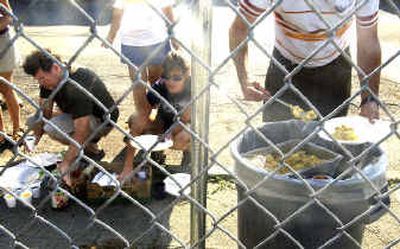Glimpse of another life

Lisa Miles-Conrad walked up to the House of Charity in downtown Spokane armed with a brand-new sleeping bag.
As she made her way to the front door of the shelter Friday night, a woman sitting on the stoop outside eyed the bedroll and approached her.
“Are you going to donate that?” the woman asked.
“I told her to come back tomorrow, and I would give it to her,” Miles-Conrad said.
Miles-Conrad, along with other members of the community and area churches, paid $30 each to sleep overnight at the homeless shelter as part of the mission-style retreat called the Urban Plunge. The group ate Saturday morning breakfast out of a garbage can in the alley and planned a lunch with the homeless in an effort to learn more about their plight.
Organized in part by psychologist Jerry Schwab, who volunteers at the shelter, the event is the first of its kind in Spokane.
“We’ve had younger students come in for missions and retreats, but never adults,” Schwab said.
He hopes there will be many Urban Plunges to come.
“The reality is that there’s a lot of people that go to church and hear about this stuff, but they don’t really experience it,” Schwab said. “We don’t often rub shoulders with people different than us. Sometimes people have no clue.”
This time of year, the shelter is closed to the homeless in the evening, opening at 7:30 a.m. for breakfast each day. Homeless people filter in and out of the tidy, dormered building at Browne and Pacific for the rest of the day. They sleep, read, wash their clothes and make phone calls in the Catholic Charities shelter, which opened in 2000. The doors close at 3 p.m., after lunch.
Upstairs, there is a dormitory with 107 beds, where homeless men can spend nights. But from April until the temperature drops in autumn, those beds remain empty. To save money, the homeless shelter does not provide men with beds during the summer months, when conditions outside are more tolerable.
There are other shelters for women and children, though they are welcome at the House of Charity during the day.
The Urban Plunge was an exception to the rules against women spending the night, and on Friday night, Miles-Conrad crawled into her new sleeping bag on bed No. 46.
The people sleeping on the street outside the shelter were a sad and sober reality to those only pretending to be homeless.
“I’m here because I want to make a difference,” Miles-Conrad said.
The group spent Friday night singing and praying in a glass chapel in the shelter’s main hall. After dark, they toured the seedier parts of downtown Spokane on foot.
They visited the detoxification center on South Howard.
They stopped and visited with folks from Truth Ministries, which runs another downtown shelter for the homeless across from the Greyhound station.
Spokane City Councilman Bob Apple participated Friday but did not stay the night.
“I find it very offensive that people would find it OK to criminalize homelessness,” said Apple, who opposed a recently adopted ordinance that bans transient camping on city property.
Now that the ordinance is law, the House of Charity is hoping that the city will help fund year-round accommodations.
On Saturday morning, as homeless people began to gather outside, the more affluent visitors gathered their belongings and made their way downstairs.
Schwab lined a garbage can with a clean plastic bag, then set a pan of scrambled eggs inside.
He wheeled the can down an alley behind the shelter and invited the Urban Plunge visitors to join him for breakfast.
As the group sat in the morning sun enjoying their meal of bagels, strawberries and eggs, a couple appeared carrying black plastic garbage bags full of belongings.
The group invited the pair to join them.
“It’s hard to be put in their shoes. There’s really no way to do that,” said Marianne Frase, one of the participants. “For us, when the going gets tough, we can always go home.”
Frase and her husband, Ron, who also attended the event, help form a partnership between their church, Manito Presbyterian, and the Mayan K’ekchi, an indigenous people from Guatemala.
They recently brought impoverished Guatemalan women for a tour through the House of Charity, to show them that “there is also poverty in America,” Marianne Frase said.
“There are many ways that the churches and community can address the issue and become involved,” Frase said. “We know we cannot fix it, but just being here really does raise awareness.”